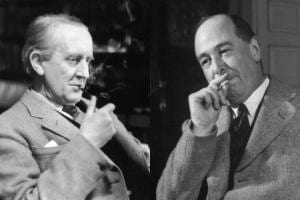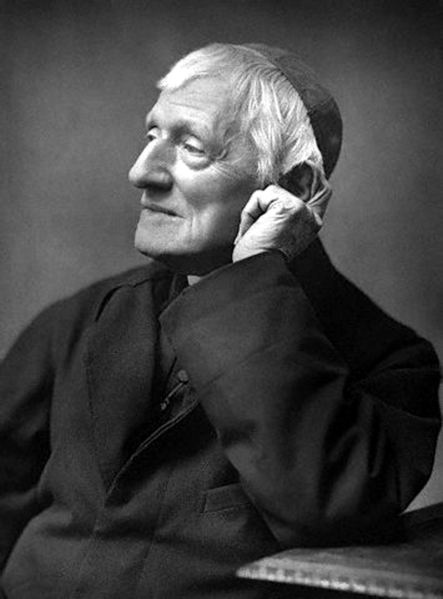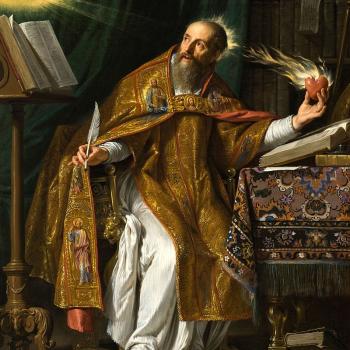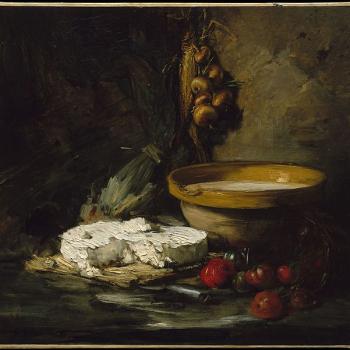And now the final section in my questions to Patheos Catholic Writers. In this particular question several writers without consulting each other gave the same answers. I will give examples of each of these authors they mention at the very end of everyone else’s answers.

For more in the Patheos Writers series please consult
The Catholic Bard’s Guide to Patheos Writers
If you could have lunch with any deceased writer who would it be, what would you eat and what would you talk about?
Dave Armstrong
St. Paul, pizza, and justification.
“If your enemy is hungry, give him something to eat; if thirsty, something to drink. By this, you will be heaping red-hot coals on his head.
Do not be mastered by evil, but master evil with good.”
St. Paul, Romans 12: 20-21
Carl McColman
Easily Julian of Norwich. I’d want to hear more about her visions, about what inspired her to write about them, and what advice she would have for people like me who try to write about prayer.
“Grace transforms our failings full of dread into abundant, endless comfort … our failings full of shame into a noble, glorious rising … our dying full of sorrow into holy, blissful life. …. Just as our contrariness here on earth brings us pain, shame and sorrow, so grace brings us surpassing comfort, glory, and bliss in heaven … And that shall be a property of blessed love, that we shall know in God, which we might never have known without first experiencing woe.”
― Julian of Norwich, Revelations of Divine Love
Mark Shea
I’d sit in the corner with the Inklings and just listen. I’m not worthy.
Besides Lewis and Tolkien, the third most prominent member of the Inklings was Charles Williams, an editor at Oxford University Press, who began attending meetings when the Press moved from London to Oxford during World War II. Other regular members of the Inklings included Lewis’s brother, Warren Hamilton Lewis, Victor “Hugo” Dyson, Adam Fox, Lord David Cecil, Neville Coghill, Owen Barfield, Robert “Humphrey” Havard, Gervase Mathew, and Commander James Dundas-Grant.
David C. Downing, PhD,Who Were the Inklings?

Mark Wilson
Fr. Benedict Groeshel. We would talk about spirituality and I would ask him all my scrupulous questions about the Catholic faith. I think having lunch at Bertucci’s would be good because they give you those free rolls and it has good ambiance.
I think divine illumination operates in our spiritual lives in somewhat the same way as a single candle. God promises to shine his light on our pathway, but usually only a few steps ahead at a time. Although on rare occasions a floodlight may break through our fleshly fog, we tend to complain that we’ve been given only flashlights—with batteries that seem to go dead right
Fr. Benedict Groeschel, Quiet Moments: With Benedict Groeschel, 120 Daily Readings
I think I would also like St. Pope John Paul 2 to be there also to give his insights also. Maybe also Fulton Sheen. We could also pray together after.
“Books are the most wonderful friends in the world. When you meet them and pick them up, they are always ready to give you a few ideas. When you put them down, they never get mad; when you take them up again, they seem to enrich you all the more.”
― Fulton J. Sheen, Life is Worth Living
But I would also say L. Frank Baum and C.S. Lewis.
Having heard old Mombi pronounce the magic words, and having also succeeded in bringing the Saw-Horse to life, Tip did not hesitate an instant in speaking the three cabalistic words, each accompanied by the peculiar gesture of the hands.
It was a grave and impressive ceremony.
As he finished the incantation the Thing shuddered throughout its huge bulk, the Gump gave the screeching cry that is familiar to those animals, and then the four wings began flopping furiously.
Tip managed to grasp a chimney, else he would have been blown off the roof by the terrible breeze raised by the wings. The Scarecrow, being light in weight, was caught up bodily and borne through the air until Tip luckily seized him by one leg and held him fast. The Woggle-Bug lay flat upon the roof and so escaped harm, and the Tin Woodman, whose weight of tin anchored him firmly, threw both arms around Jack Pumpkinhead and managed to save him. The Saw-Horse toppled over upon his back and lay with his legs waving helplessly above him.
And now, while all were struggling to recover themselves, the Thing rose slowly from the roof and mounted into the air.
L. Frank Baum, The Marvelous Land of Oz
We could talk about the art of writing fantasy and creativity. I think there are a lot of places that you could go in that wood between the worlds.
“As he rose to his feet he noticed that he was neither dripping nor panting for breath as anyone would expect after being under water. His clothes were perfectly dry. He was standing by the edge of a small pool—not more than ten feet from side to side in a wood. The trees grew close together and were so leafy that he could get no glimpse of the sky. All the light was green light that came through the leaves: but there must have been a very strong sun overhead, for this green daylight was bright and warm. It was the quietest wood you could possibly imagine. There were no birds, no insects, no animals, and no wind. You could almost feel the trees growing. The pool he had just got out of was not the only pool. There were dozens of others—a pool every few yards as far as his eyes could reach. You could almost feel the trees drinking the water up with their roots. This wood was very much alive.”
― C.S. Lewis, The Magician’s Nephew
Kristin Wilson
John the Apostle. We would go to Mass and after that we would eat bread and fish. We would talk about what it was like to know Jesus the way he knew him. Also basic historical facts. Did Mary go to the last supper. If that is your mother and it’s the last supper you would totally invite her, especially if her spouse is dead, as History tells us although I don’t think it’s written anywhere.
When the wine was gone, Jesus’ mother said to him, “They have no more wine.” “Woman,why do you involve me?” Jesus replied. “My hour has not yet come.” His mother said to the servants, “Do whatever he tells you.” John 2: 3-5
JoAnn Wuland
G.K. Chesterton, we’d have a full English pub meal (steak and ale pie, for example), and we’d talk about Catholicism and the issues of the modern world.

Rene Albert
I would have lunch with C.S. Lewis and J.R.R. Tolkien. I would prepare a platter of Tim Hortons assorted donuts and call them Turkish Delight and Lembas bread. Then I would watch them fight about the use of allegory.
Theresa Zoe Williams
Flannery O’Connor, I don’t know that we would eat anything because I’d like to learn more about her peafowl and that doesn’t seem like an “over a meal” topic.

Will Duquette
Trouble is, I get tongue-tied when face to face with anyone that I idolize, or I say dumb things. But if I could put, say, Thomas Aquinas, Tolkien, Lewis, Chesterton, and maybe Flannery O’Connor at the table and sit and listen the food would be irrelevant. Also, there would probably be beer.
David Mills
Newman and the answer to number four.
Eve Tushnet
I’m a total self-parody so I’ll say Oscar Wilde. We’d eat oysters and use the wrong forks. We’d talk about, I don’t care, Michelangelo and which of his biopics he likes best and if he understands Carmelites because I sure don’t. When you’re in purgatory, can you tell that you’re being loved???
“It is sweet to dance to violins
When love and life are fair:
To dance to flutes, to dance to lutes
Is delicate and rare:
But it is not sweet with nimble feet
To dance upon the air!”
— Oscar Wilde, The Ballad of Reading Gaol (1898)
Emily Schmitt
I tried to come up with something more original, but I’m a playwright and I’d pick Shakespeare. We would eat shrimp risotto and we would talk about DRAMATIC STRUCTURE all night long.
“All the world’s a stage,
And all the men and women merely players;
They have their exits and their entrances;
And one man in his time plays many parts,
His acts being seven ages.”
― William Shakespeare, As You Like It“There are more things in Heaven and Earth, Horatio, than are dreamt of in your philosophy.”
― William Shakespeare, Hamlet
Edwin Woodruff Tait
Probably C. S. Lewis. I would love to talk to him about events since his time, particularly fantasy and sci-fi literature, and get his reactions.
Avellina Balestri
Carlol Houselander, who was a British Catholic author. Probably end up going to a British
British pub. Fish and Chips or something like that. That would be lovely and talk to her about Christian mystism. Hopefully somewhere in the English country side. That would be very interesting.
“Christ asks for a home in your soul, where he can be at rest with you, where he can talk easily to you, where you and he, alone together, can laugh and be silent and be delighted with one another.”
— Caryll Houselander (This War Is the Passion)
Pat McNamara
Definitely St. John Henry Newman, definitely an English dish, and definitely about his life as a Catholic priest and Cardinal.

Fellow Dying Inmate
I miss my teacher and friend, John Pilch. I would like very much to have dinner with him again. We would eat bbq ribs, steak fries, drink cold beer, and talk sky vault opera (in addition to being a world-renown Scripture scholar, John was an accomplished opera performer, something he no doubt continues in Alternate Reality).
Researchers have always realized that no one possesses immaculate perception. Every researcher inevitably begins from a personal perspective within the researcher’s own culture. Perhaps there is no other way to begin. That is why comparative studies, such as psychological anthropology, and other anthropological disciplines, are so pertinent to biblical studies. The vast majority of biblical scholars are outsiders to the culture they are investigating. tigating. If they do not use a comparative approach, they run the risk of interpreting terpreting ancient Mediterranean texts anachronistically and ethnocentrically.
John J. Pilch, Flights of the Soul: Visions, Heavenly Journeys, and Peak Experiences in the Biblical World
But it’s hard to think of John as dead… other than him it’s a toss up between “Mark” and “John.”
A young man, wearing nothing but a linen garment, was following Jesus. When they seized him, he fled naked, leaving his garment behind. Mark 14:51-52 New International Version
Peter turned and saw that the disciple whom Jesus loved was following them. (This was the one who had leaned back against Jesus at the supper and had said, “Lord, who is going to betray you?” John 21:20 New International Version
I would like to dine with both on fire-roasted lamb in lemon and garlic and spices with sweet wine and lots of bread. And the topic would be Jesus, of course, someone neither met in consensus reality. I just want to watch how long it would take for both these men to, at six to eight inches between their noses, begin screaming at each other about their very different images of Jesus.
Rebecca Hamilton
I think it would be interesting to have lunch with Kurt Vonnegut. If he could bear talking about it, I would want to learn more about what he experience as a prisoner of war in the Dresden fire bombing. He alluded to that in some way in almost all of his writing and wrote about it a little bit in Slaughterhouse Five. I like to imagine that we’d have hamburgers and fries at a local joint I know and talk all afternoon.
“- Why me?
– That is a very Earthling question to ask, Mr. Pilgrim. Why you? Why us for that matter? Why anything? Because this moment simply is. Have you ever seen bugs trapped in amber?
– Yes.
– Well, here we are, Mr. Pilgrim, trapped in the amber of this moment. There is no why.”
― Kurt Vonnegut Jr., Slaughterhouse-Five
William Hemsworth
St. Thomas Aquinas and we would eat steak and drink beer. Would love to discuss the Eucharist and transubstantiation with him.

Marie Avers
Flannery O’Connor. We would eat southern food and bemoan the absurd hypocrisy we see in the Church and in Christians, and then we would brainstorm how we could roast them in thinly veiled ways in our stories.
Rebecca Bratton Weiss
Hemingway, no question. We would go trout fishing, and drink whiskey, and talk about politics. Or whatever happened to cross our minds.
“All good books are alike in that they are truer than if they had really happened and after you are finished reading one you will feel that all that happened to you and afterwards it all belongs to you: the good and the bad, the ecstasy, the remorse and sorrow, the people and the places and how the weather was. If you can get so that you can give that to people, then you are a writer.”
― Ernest Hemingway, A Letter from Cuba (1934)
Jen Fitz
John C. Hathaway; Waffle House; Heaven. He’d probably also have a few stern warnings for me, and a couple requests on behalf of friends who wish I’d get my act together.
I think it is the abuse and the not-so-secret double lives of clerics (and wealthier laity) which makes people doubt that the Eucharist is the true Body and Blood of Christ and doubt that Confession is something necessary. The narcissism of the priests I have known has been horrible and caused many to leave. That is the truth. If you want people to believe, have the entire hierarchy repent, sell all their riches and give the money to the poor. Make a vow of poverty a requirement. And if they are frauds using the priesthood for their own selfish desires, remove them at once.
John C. Hathaway, Why Catholics don’t believe in the Eucharist and other sacraments (November 30, 2019) Lewis Crusade
Scott Eric Alt
Charles Dickens
The pork pie that Pip steals to give to Magwitch
What the rest of the plot in his unfinished novel Edwin Drood would have been
The mist was heavier yet when I got out upon the marshes, so that instead of my running at everything, everything seemed to run at me. This was very disagreeable to a guilty mind. The gates and dikes and banks came bursting at me through the mist, as if they cried as plainly as could be, “A boy with somebody else’s pork pie! Stop him!”
Charles Dickens, Great Expectations
Monsignor Eric Barr
I would love to have lunch with Tolkien, introduce him to pizza, and talk about the state of fantasy in modern literature.
Fr Matthew P. Schneider, LC
In my lifetime, I theoretically could have sat down with John Paul II,

Richard John Neuhaus
“Respect for the dignity of others includes treating them as rational creatures capable of being persuadad by rational argument, even in the face of frequent evidence to the contrary.”
— Richard John Neuhaus (American Babylon: Notes of a Christian Exile)
or even Fr. John Ford, SJ (although he died when I was a child) who are great writers.
John Cuthbert Ford, SJ, was a major figure in the history of moral theology ogy in the United States from the early 1940s up to the late ig6os. Contemporary temporary references to Ford’s work, however, have been limited to his writings on obliteration bombing, contraception, and alcoholism. The absence of any comprehensive examination of his contribution to moral theology provides the rationale for this study of Ford’s writings and method as a moral theologian.
Eric Marcelo O. Genilo. John Cuthbert Ford, SJ: Moral Theologian at the End of the Manualist Era (Moral Traditions series)
Maybe St. Therese of Lisieux
“The splendor of the rose and the whiteness of the lily
do not rob the little violet of it’s scent nor the daisy of its simple charm.
If every tiny flower wanted to be a rose, spring would lose its loveliness.”
― St. Therese of Lisieux
Stephanos Pedrano
Spaghetti with clams. Tolkien. The layers of mythopoeia in the evangelist John’s contemplation of Christ.
And now the writers that have more then one mention in this post.
“Sorrow can be alleviated by good sleep, a bath and a glass of wine”
― St.Thomas Aquinas“God has created me to do Him some definite service. He has committed some work to me which He has not committed to another. I have my mission. I may never know it in this life, but I shall be told it in the next. I am a link in a chain, a bond of connection between persons.
He has not created me for naught. I shall do good; I shall do His work. I shall be an angel of peace, a preacher of truth in my own place, while not intending it if I do but keep His commandments.
Therefore, I will trust Him, whatever I am, I can never be thrown away. If I am in sickness, my sickness may serve Him, in perplexity, my perplexity may serve Him. If I am in sorrow, my sorrow may serve Him. He does nothing in vain. He knows what He is about. He may take away my friends. He may throw me among strangers. He may make me feel desolate, make my spirits sink, hide my future from me. Still, He knows what He is about.”
― John Henry Newman“Children are grateful when Santa Claus puts in their stockings gifts of toys or sweets. Could I not be grateful to Santa Claus when he put in my stockings the gift of two miraculous legs? We thank people for birthday presents of cigars and slippers. Can I thank no one for the birthday present of birth?”
― G.K. Chesterton, Orthodoxy“Still, I wonder if we shall ever be put into songs or tales. We’re in one, of course, but I mean: put into words, you know, told by the fireside, or read out of a great big book with red and black letters, years and years afterwards –
– J.R.R. Tolkien, The Two Towers“It is a serious thing to live in a society of possible gods and goddesses, to remember that the dullest most uninteresting person you can talk to may one day be a creature which, if you saw it now, you would be strongly tempted to worship, or else a horror and a corruption such as you now meet, if at all, only in a nightmare. All day long we are, in some degree helping each other to one or the other of these destinations. It is in the light of these overwhelming possibilities, it is with the awe and the circumspection proper to them, that we should conduct all of our dealings with one another, all friendships, all loves, all play, all politics. There are no ordinary people. You have never talked to a mere mortal. Nations, cultures, arts, civilizations – these are mortal, and their life is to ours as the life of a gnat. But it is immortals whom we joke with, work with, marry, snub, and exploit – immortal horrors or everlasting splendors.”
― C.S. Lewis, The Weight of Glory (1942)“There is something in us, as storytellers and as listeners to stories, that demands the redemptive act, that demands that what falls at least be offered the chance to be restored. The reader of today looks for this motion, and rightly so, but what he has forgotten is the cost of it. His sense of evil is diluted or lacking altogether, and so he has forgotten the price of restoration. When he reads a novel, he wants either his sense tormented or his spirits raised. He wants to be transported, instantly, either to mock damnation or a mock innocence.”
― Flannery O’Connor, Mystery and Manners: Occasional Prose“Artistic talent is a gift from God and whoever discovers it in himself has a certain obligation: to know that he cannot waste this talent, but must develop it.”
― Pope John Paul II














